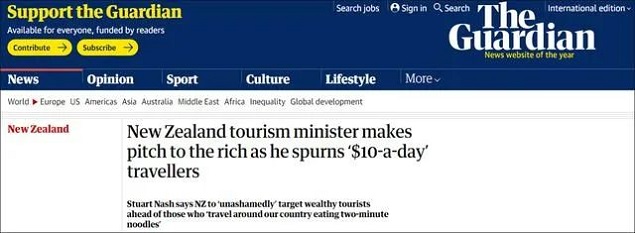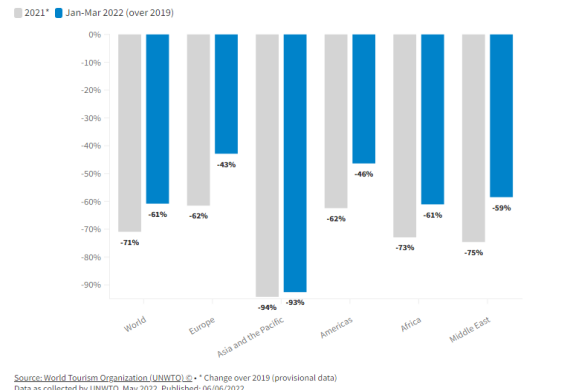新西兰旅游部长:欢迎富人,拒绝穷游 NZ “unashamedly” target wealthy tourists
据英国《卫报》11日报道称,新西兰旅游部长近日再次表达了他对穷游游客的反感。他声称,新西兰不希望吸引那些“每天只花10美元,吃着方便面游遍我们国家的游客”。
New Zealand’s tourism minister has again expressed his aversion to budget travellers, saying the country will not seek to attract those who “travel around our country on $10 a day eating two-minute noodles”.

斯图尔特·纳什表示,新西兰会继续专注有高消费能力的“高净值”人群。尽管有专家指出,这类游客通常对环境带来更多的影响,而且他们不一定会对新西兰经济做出更大贡献。
Stuart Nash said the country would unashamedly continue to focus on “high quality” big spenders, despite one expert saying such visitors typically had a much higher environmental footprint and didn’t necessarily contribute more to the economy.
随着新西兰国境重新开放,纳什在8月10日宣布将增加旅游业从业人员,并表示新西兰会继续招徕“大手笔”游客。他说:“我们的营销策略会"公然"的面向高质量游客。”
At an announcement on last Wednesday about plans to bolster the tourism workforce as the country’s borders reopened, Nash said the country would continue to focus on “big spender” visitors. “In terms of targeting our marketing spin, it is unashamedly going to be at … high-quality tourists,” he said.
“我们也欢迎背包客,但我们不会将目标人群锁定那些在脸书上分享如何每天只花10美元,吃着方便面游遍新西兰的游客。”
"We are going to welcome backpackers … [but] we are not going to target the people who put on Facebook how they can travel around our country on $10 a day eating two-minute noodles.”
尽管这位部长在发言中仍对背包客和低预算游客表示欢迎,但他对富有游客的关注在过去一直存在争议。
While the minister has said backpackers and lower-budget visitors were still welcome in New Zealand, his focus on rich tourists has been controversial in the past.
就在2020年,纳什提到新西兰将“公然”聚焦超级富豪,并将努力吸引那些“乘坐商务舱或豪华经济舱、租用直升机在法兰士·约瑟夫冰川观光、然后在高档餐厅用餐”的游客。这一提议随即引发热议,某评论员表示部长的言论“势利、精英主义且脱离现实。”
In 2020, Nash said the country would “unashamedly” target the super wealthy, and seek to attract the kind of tourist who “flies business class or premium economy, hires a helicopter, does a tour round Franz Josef and then eats at a high-end restaurant”. The proposals attracted some heat, with one commentator calling them “snobby, elitist and out of touch.”
奥塔哥大学旅游系教授詹姆斯·希格姆表示,他还没有看到任何研究证据能够证明,“高净值群体”对新西兰旅游业的贡献比低预算游客更多。
The assumption that “high net worth individuals” contributed more to New Zealand than budget travellers wasn’t necessarily backed up by the research, said Prof James Higham, a professor of tourism at Otago University. “I’ve seen no evidence for that,” he said.
他说:“近几十年,全球旅游业的趋势是游客走得更远,更快到达目的地,产生更多二氧化碳,停留时间更短,在目的地消费更少。”
"The trend over recent decades globally has been for tourists to travel further, travel faster, produce more CO2, stay shorter and spend less at the destination,” he said.
这种趋势往往导致“富豪们在破坏地球时并没有像人们预期或希望的那样为旅游目的地做出贡献”。
The result, he said, was often “very wealthy people destroying the planet in the process of not contributing to destinations as we might have expected or hoped”.
“富豪游客通常对环境危害最大,而且因为他们往往……定期重复多次在目的地停留时间很短的高碳旅行……他们对新西兰尤其是偏远地区的旅游业并不会特别有利。”
"Big spenders are often the most environmentally damaging, and because they tend to have … regular repeat high carbon travel with low length of stay … they’re not particularly beneficial, particularly to far flung destinations made in New Zealand.”
而那些收入较低的游客,比如留学生和背包客,通常会在新西兰停留更长时间,停留时间的长短与在新西兰的累计消费额直接相关。
Tourists who tend to be on a lower income – such as international students and backpackers – often stayed for longer in the country, and length of stay was directly correlated with cumulative in-country spending, he said.
打个比方,游轮上的游客通常都很富裕,但这一占游客总数9%的人群的消费额,只占所有游客总消费额的3%。希格姆说:“与留学生相比,游轮乘客对经济的贡献低到令人沮丧。”
Cruise ship visitors, for example, were typically affluent, but made up only 3% of visitor spend, despite being 9% of visitors. “The economic contribution of cruise passengers is dismal compared to students who come here to study,” he said.
希格姆还说,穷游游客也经常是回头客,那些以背包客身份来旅游的人未来可能会以劳动者或游客的身份回到新西兰。
Budget travellers were also often repeat visitors – those who came as backpackers might return as workers, or as tourists later in life, Higham said.
纳什发表上述言论之际,新西兰正试图重建其旅游产业及从业人员队伍。此前,新西兰因疫情的防控措施而与海外隔离了一年。
Nash’s comments come as New Zealand is attempting to rebuild its tourism workforce and industry after a year spent closed off from the world by pandemic protections.
在新冠疫情爆发之前,国际旅游业曾是新西兰经济的一个重要组成部分——其直接和间接贡献占到了GDP总额的9.3%——但游客数量的增加也引发了越来越多人对环境恶化、过度拥挤和基础设施压力等问题的担忧。
Before Covid-19, international tourism made up a huge chunk of the country’s economy – its direct and indirect contribution is 9.3% of GDP – but increasing visitor numbers had also prompted growing concerns about environmental degradation, overcrowding and pressure on infrastructure.
来源 | 卫报 The Guardian
译文 | 中国日报网 China Daily
相关文章
权威话题
- 香港缩短入境隔离时间,推出“3+4”新方案 Hong Kong quarantine cut
- 7+3 China shortens centralized quarantine periods
- China streamlines procedures for international arrivals
- Camping Industry Is Expected to Boom
- WEEKLY HEADLINES 2022.6.18-6.24
- Recovery of tourism industry depends on market force
- WEEKLY HEADLINES 2022.6.25-7.1
 请扫描左侧二维码添加关注“旅业网”,或搜索微信公众号“旅业网”,了解旅游行业动态及价值资讯。旅业传媒,引领行业创新发展的媒体集群。
请扫描左侧二维码添加关注“旅业网”,或搜索微信公众号“旅业网”,了解旅游行业动态及价值资讯。旅业传媒,引领行业创新发展的媒体集群。 


 0
0

 2022-08-18
2022-08-18






